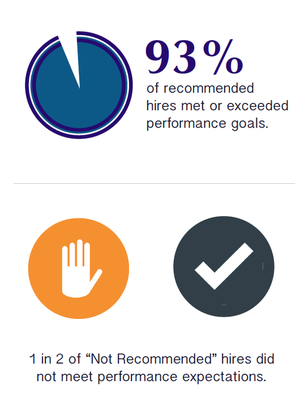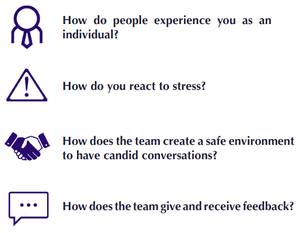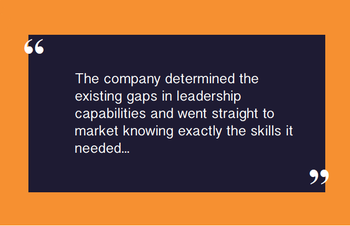Analyzing Future Leadership
20 June 2017
Assessments serve as a robust tool that empower companies to make informed decisions when managing their human capital strategy. Through several case studies, IIC Partners explores how Assessments can enhance a succession plan, identify successful candidates, discover hidden talent and enable future leaders.
Analyzing Future Leaders – White Paper
Building Performance Through Assessments
In today’s current economic climate, identifying, recruiting and retaining your best talent is critical. Organisations that leverage their human capital as a competitive advantage are more likely to experience success. One way in which organisations can map internal talent and discover new leaders is through the use of Assessments.
Assessments are a flexible tool that can be adapted to a wider range of human resource management methodologies to stimulate, align and foster the relationship between employee and organisation. In recent years, Assessments have taken a much more proactive role in talent management. Today, Assessments are used to develop new and existing talent to best prepare an organisation for the future and generate valuable insights that contribute to the way a company attracts, selects, trains, compensates, evaluates and retains its human capital.
- t
- Ensuring Your ROI & Reducing The Cost of Employee Turnover
- Aligning The Senior Executive Team
- Selecting The Best Talent & Eliminating Risk
- Identifying The Next Generation of Leadership
t
t
t
Enabling New Leaders
Assessments can evaluate every level of an organisation. This strategy helps human resources departments and professionals map internal talent and the skills readily available within teams. By conducting a variety of interviews, tests and job simulations, employees are objectively critiqued and categorized by their behavioral and core performance competencies. The analysis conducted by Assessments is standardized to offer a fair evaluation for all employees and omit any prejudices related to age, gender, race or other demographics.
Case Study: Ensuring Your ROI & Reducing The Cost of Employee Turnover
One of Canada’s leading financial institutions providing health, automotive and home insurance services wanted to improve its hiring capabilities. The company faced challenges with time to hire and the high cost of employee turnover. HR identified the “Sales Advisor” position as a key role that met both of these criteria. This role generated significant revenue but also represented a high cost center for the company when an employee left. For example, the company invested $20,000 for each newly hired Sales Advisor to spend 90 days in training. The company knew it needed to improve its selection process to better predict and identify the high functioning and longer tenured candidates suited to succeed in the role.
 The company retained Optimum Talent in Canada and their SuccessFinder tool to build a performance benchmark Assessment based upon large data sets for high and low performers. The result was a personalized profile specific to the Sales Advisor role that could predict success and recommend or discourage hiring candidates.
The company retained Optimum Talent in Canada and their SuccessFinder tool to build a performance benchmark Assessment based upon large data sets for high and low performers. The result was a personalized profile specific to the Sales Advisor role that could predict success and recommend or discourage hiring candidates.
The Assessment program lasted for 18 months. After the initial training period and 12 months of serving in the role, new hires from the prior year were evaluated to test the accuracy of SuccessFinder’s predictions. Based on 80 total hires that were part of the Assessment, 93% of recommended hires met or exceeded performance goals, while over 50% of the “Not Recommended” hires did not meet performance expectations.
Simulating Core Competencies
Assessments provide organisations with an opportunity to evaluate prospective candidates as if they have been employed at the company for several years. This is done through the use of simulation. When a candidate completes an Assessment simulation, his or her professional, personal and managerial competencies are evaluated to a degree that significantly reduces the risk of hiring the wrong candidate.
Key skills and core competencies are matched and aligned with the company culture and other factors that contribute to the success of a role. In addition to analyzing external candidates, Assessments verify talent hired by internal recruitment teams. Management audits can be implemented to define and develop a succession plan and uncover hidden challenges and strengths of entire teams.
Case Study: Aligning The Senior Executive Team
 A major US health insurer retained Furst Group, located in Chicago, to search for and appoint a new CEO. The Furst Group worked with the CEO on an extensive plan including onboarding, setting expectations, goals and establishing boundaries for his relationship with the Board of Directors. The plan achieved great success and the CEO asked to continue the Assessment with his senior leadership team to improve performance.
A major US health insurer retained Furst Group, located in Chicago, to search for and appoint a new CEO. The Furst Group worked with the CEO on an extensive plan including onboarding, setting expectations, goals and establishing boundaries for his relationship with the Board of Directors. The plan achieved great success and the CEO asked to continue the Assessment with his senior leadership team to improve performance.
Two different Assessments were used. The first was employed to measure personal style, leadership behavior, motivators and behaviors that could hamper leadership development. The second Assessment measured decisionmaking, judgment and cognitive intelligence skills. After these Assessments were completed, debriefing sessions were held with each team member and a leadership development plan was designed. The senior executive team was presented with a synthesis summarizing the results and how the team interacted and worked together. An offsite workshop was held to plan for how the group decided it would function moving forward. This included small group exercises and one-on-one role-playing to bring awareness to a number of key areas, including:
- t
- How do people experience you as an individual?
- How do you react to stress?
- How does the team create a safe environment to have candid conversations?
- How does the team give and receive feedback?
t
t
t
Case Study: Selecting The Best Talent & Eliminating Risk
Over an 8-year period, a Fortune 500 corporation retained Human Capital Group, located in Copenhagen, to execute nearly 200 Assessments. These Assessments were conducted for prospective external candidates who were being considered for various VP and C-Suite level roles across the company’s subsidiaries worldwide. In addition to assessing external talent, the company requested Assessments be conducted for mapping internal talent to probe promotion readiness and identify a succession plan.
As a result of the Assessments, between 30% and 40% of external C-level candidates were excused from the hiring process. Assessments for these external candidates showed that the personal and professional skills did not match the competencies necessary to succeed in the role. The success rates for candidates hired after undergoing Assessment were remarkably higher compared to when the corporation had not used Assessments in the past.
Case Study: Identifying The Next Generation of Leadership
 A major healthcare group hired Envision Partnership, in Dubai, to develop an Assessment Center to demonstrate to a team of engineers and scientists the challenges presented when managing teams and direct reports. The company wished to develop these scientists and engineers as future leaders and provide them the proper training, skills and tools required to succeed. During the Assessment process, the engineers and scientists had the opportunity to discover their own managerial strengths and shortcomings. The company then identified the scientists and engineers ready to promote to a more senior management level.
A major healthcare group hired Envision Partnership, in Dubai, to develop an Assessment Center to demonstrate to a team of engineers and scientists the challenges presented when managing teams and direct reports. The company wished to develop these scientists and engineers as future leaders and provide them the proper training, skills and tools required to succeed. During the Assessment process, the engineers and scientists had the opportunity to discover their own managerial strengths and shortcomings. The company then identified the scientists and engineers ready to promote to a more senior management level.
By implementing Assessments, the company was able to analyze the talent in existing internal teams, identify strengths and areas of improvement and successfully promote from within. Through this process, the company determined the existing gaps in leadership capabilities and went straight to market knowing exactly the skilled leaders it needed.
Creating A Lean Workforce
Consolidation is a challenge that many organisations face. In difficult economic times or periods of intense change, companies are charged with reevaluating their operations and talent. In these situations, Assessments aim to minimize the loss of productivity while retaining an organisation’s most valuable employees. Assessments analyze the requirements and demands needed to successfully restructure departments and the personnel necessary to do so. This strategy provides at-risk or affected employees a fair chance and opportunity to demonstrate his or her performance capabilities. A significant number of companies across the globe use Assessments to make informed decisions, rebuild teams and implement redeployment initiatives to optimize performance. Information and insights gathered from Assessments create an objective roadmap for identifying the top-performing talent to retain.
Succession planning, promoting internal leaders and hiring the right candidate the first time are a few ways in which Assessments can improve a company’s human capital strategy. Presenting a current employee with a higher level of responsibility or hiring externally for a new role is an important decision. Assessments serve as a powerful instrument to enable companies to set employees and teams up for success.
IIC Partners Leadership Consulting Services:
Recognizing that our clients often require services beyond executive search, IIC Partners offers a range of leadership consulting solutions to help with talent management needs. These services can be used to augment, enhance and strengthen your leadership team and include:
- t
- Board & Leadership Assessment
- Succession Planning
- Market Mapping
- Leadership Advisory
- Executive Coaching
t
t
t
t




